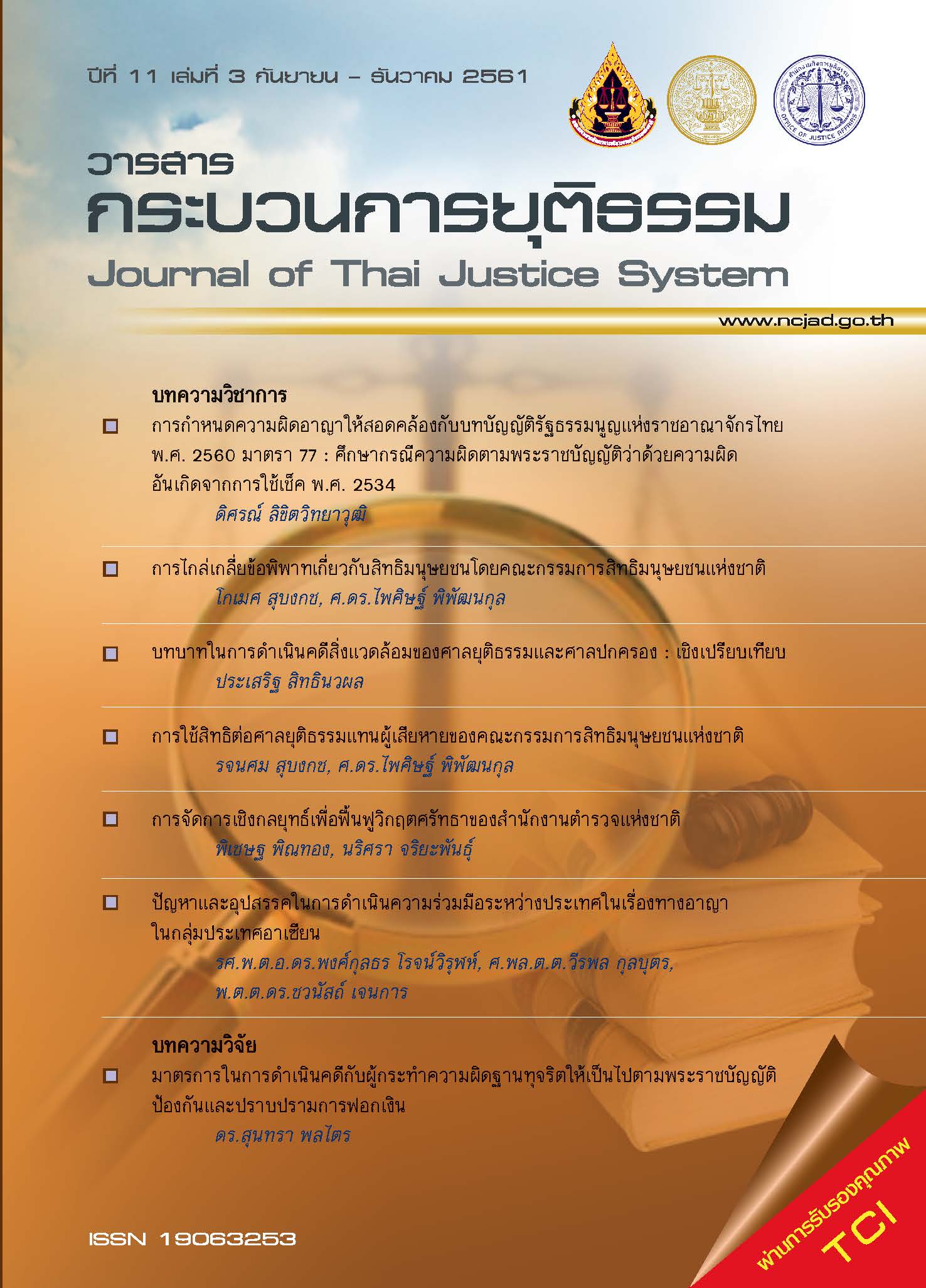ปัญหาและอุปสรรคในการดำเนินความร่วมมือระหว่างประเทศในเรื่องทางอาญาในกลุ่มประเทศอาเซียน
Main Article Content
บทคัดย่อ
การรวมกลุ่มประชาคมอาเซียนจะส่งผลให้เกิดปัญหาอาชญากรรมข้ามชาติและการกระทำผิดของคนต่างชาติมากยิ่งขึ้นจากการเปิดช่องโอกาสให้มีการข้ามพรมแดนไปมาระหว่างกันและการเคลื่อนย้ายแรงงานข้ามชาติมากขึ้น ในการนี้กลุ่มประเทศอาเซียนทั้ง 10 ประเทศได้มีการลงนามในสนธิสัญญาว่าด้วยความช่วยเหลือซึ่งกันและกันในเรื่องทางอาญาในภูมิภาคอาเซียน (The Treaty on Mutual Legal Assistance in Criminal Matters among Liked-Minded ASEAN Member Countries: MLAT ASEAN) เพื่อพัฒนาความช่วยเหลือซึ่งกันและกันในเรื่องการบังคับใช้กฎหมายให้มีประสิทธิภาพมากขึ้น อย่างไรก็ดีในช่วงที่ผ่านก็ยังพบปัญหาข้อขัดข้องทั้งในทางปฏิบัติและในข้อกฎหมายอีกหลายประการ บทความนี้เป็นการนำเสนอให้เห็นถึงปัญหาที่เกิดขึ้นจากความร่วมมือระหว่างประเทศทางอาญาภายหลังจากลงนาม MLAT ASEAN ไม่ว่าจะเป็นกฎหมายล้าสมัยไม่ได้ให้อำนาจหน้าที่การให้ความร่วมมือกับหน่วยงานที่บังคับใช้กฎหมายตามกฎหมายพิเศษที่ตั้งขึ้นใหม่ การเข้าถึงพยานหลักฐานทางเทคโนโลยี ข้อขัดข้องในการสืบพยานทางไกลผ่านจอภาพ ความผิดสองรัฐที่มีบริบทแตกต่างกันในแต่ละประเทศ และข้อขัดข้องในการปฏิบัติ ปัจจุบันประเทศไทยมีการแก้ไขกฎหมายความร่วมมือระหว่างประเทศทางอาญาของประเทศให้สามารถส่งคำขอไปยังหน่วยงานบังคับใช้กฎหมายตามกฎหมายพิเศษ และเปิดช่องให้มีการพัฒนาวิธีให้ความร่วมมือพิเศษในกรณีจำเป็นเร่งด่วนกับต่างประเทศได้ อย่างไรก็ดียังมีปัญหาในการปฏิบัติกับต่างประเทศอยู่
Article Details
ต้นฉบับที่ได้รับการตีพิมพ์ในวารสาร เป็นลิขสิทธิ์ของวารสารกระบวนการยุติธรรม แต่ความคิดเห็นที่ปรากฏในเนื้อหาของบทความในวารสารกระบวนการยุติธรรม ถือเป็นความรับผิดชอบของผู้เขียนแต่เพียงผู้เดียว
เอกสารอ้างอิง
UNITED NATIONS OFFICE ON DRUGS AND CRIME [UNODC]. (2007) Model Law on Mutual Assistance in Criminal Matters. Vienna: UNODC
UNITED NATIONS OFFICE ON DRUGS AND CRIME [UNODC]. (2010) ASEAN Handbook on International Legal Cooperation in Trafficking in Persons Cases. Vienna: UNODC
กระทรวงยุติธรรม (2556) รายงานศึกษากฎหมาย กฎ ระเบียบ ข้อบังคับ ระบบงาน และแนวปฏิบัติของกระทรวงยุติธรรม และหน่วยงานที่เกี่ยวข้องกับระบบงานยุติธรรมของประเทศในอาเซียน. กรุงเทพมหานคร: กระทรวงยุติธรรม
ชัยเกษม นิติสิริ. (2551) รวมกฎหมายและสนธิสัญญาที่เกี่ยวกับความร่วมมือระหว่างประเทศในเรื่องทางอาญา .พิมพ์ครั้งที่ 6 กรุงเทพมหานคร: สำนักงานอัยการสูงสุด
ต่อศักดิ์ บูรณะเรืองโรจน์. (2558) ‘ปัญหาและอุปสรรคเกี่ยวกับความร่วมมือระหว่างประเทศในเรื่องทางอาญาในการติดตามยึดอายัดและริบทรัพย์สินและแนวทางการแก้ไข.’, วารสารอัยการ 28 (1): 65-87
ประสิทธิ์ เอกบุตร. (2551) สนธิสัญญา. กรุงเทพมหานคร: วิญญูชน
พงศ์กุลธร โรจน์วิรุฬ และคณะ (2558) ปัญหาและอุปสรรคของพนักงานอัยการในการดำเนินความร่วมมือระหว่างประเทศในเรื่องทางอาญาเมื่อเข้าสู่ประชาคมอาเซียน. รายงานวิจัย: สำนักงานอัยการสูงสุด
พัชรา สินลอยมา และคณะ. (2555) โครงการศึกษาทบทวนกฎหมายและกระบวนการยุติธรรมทางอาญาและความร่วมมือในเรื่องทางอาญาของภูมิภาคอาเซียนเพื่อเตรียมความพร้อมเข้าสู่ประชาคมอาเซียน. รายงานวิจัย: สำนักงานกิจการยุติธรรม
ยอดชาย วิถีพานิช และยุทธพงศ์ ปิ่นอนงค์. (2553) สนธิสัญญาว่าด้วยความช่วยเหลือซึ่งกันและกันในเรื่องทางอาญาของภูมิภาคอาเซียน. กรุงเทพมหานคร: เอกสารประกอบการพิจารณาในการประชุมร่วมกันของรัฐสภารัฐสภา
สมบัติ พฤติพงศ์ภัค. (2550) ‘หมายจับยุโรป (European Arrest Warrant).’, วารสารศาลยุติธรรมปริทัศน์ มีนาคม 2550
อภินันท์ ศรีศิริ (2558) ‘ปัญหาการส่งผู้ร้ายข้ามแดนระหว่างประเทศไทยกับประเทศสมาชิกอาเซียน กรณีการกำหนดเงื่อนไขโทษประหารชีวิตและความผิดทางการเมือง.’, วารสารกระบวนการยุติธรรม 8(3): 23-43


